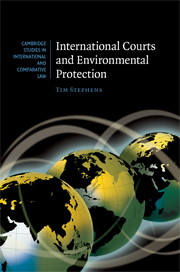Book contents
- Frontmatter
- Contents
- Foreword
- Acknowledgements
- List of tables
- List of figures
- List of abbreviations
- Table of cases
- Table of treaties and other international instruments
- CAMBRIDGE STUDIES IN INTERNATIONAL AND COMPARATIVE LAW
- 1 Introduction
- Part I International courts and environmental governance
- Part II Judicial development
- Part III Contemporary challenges
- 8 Public interest proceedings
- 9 Jurisdictional coordination
- 10 Fragmentation of international environmental law
- 11 The future of international environmental litigation
- Bibliography
- Index
10 - Fragmentation of international environmental law
from Part III - Contemporary challenges
Published online by Cambridge University Press: 21 August 2009
- Frontmatter
- Contents
- Foreword
- Acknowledgements
- List of tables
- List of figures
- List of abbreviations
- Table of cases
- Table of treaties and other international instruments
- CAMBRIDGE STUDIES IN INTERNATIONAL AND COMPARATIVE LAW
- 1 Introduction
- Part I International courts and environmental governance
- Part II Judicial development
- Part III Contemporary challenges
- 8 Public interest proceedings
- 9 Jurisdictional coordination
- 10 Fragmentation of international environmental law
- 11 The future of international environmental litigation
- Bibliography
- Index
Summary
International environmental litigation is now played out in an array of adjudicative institutions including permanent courts, ad hoc arbitral tribunals, regional courts, and judicial bodies with highly specialised subject matter jurisdiction. The preceding chapter examined the practical difficulties this presents for resolving environmental disputes. This chapter is concerned with the related but distinct question of whether international environmental law is being fragmented as a result of the patchwork character of contemporary environmental dispute settlement. Specifically by reference to human rights courts and complaints bodies and the dispute settlement system of the WTO, it assesses whether some judicial and quasi-judicial bodies are destabilising organising rules and principles of international environmental law by adopting parochial approaches to environmental norms that suit the specific purposes of non-environmental regimes. Such analysis is now desirable having regard to the recent expansion in the body of international case law on environmental issues, particularly in the human rights and trade fields.
Fragmentation of international law
International law has always comprised general norms and rules of a more specific character. However, an important feature of the contemporary international legal order is its pluralism as reflected in an increasing number of specialised regimes, rules, and institutions. While some commentators have argued that the development of quasi-autonomous legal orders unhelpfully compartmentalises international law, others have observed that decentralisation can advance community objectives not attained through general rules.
- Type
- Chapter
- Information
- International Courts and Environmental Protection , pp. 304 - 344Publisher: Cambridge University PressPrint publication year: 2009



